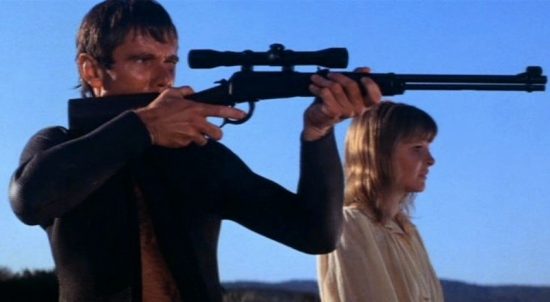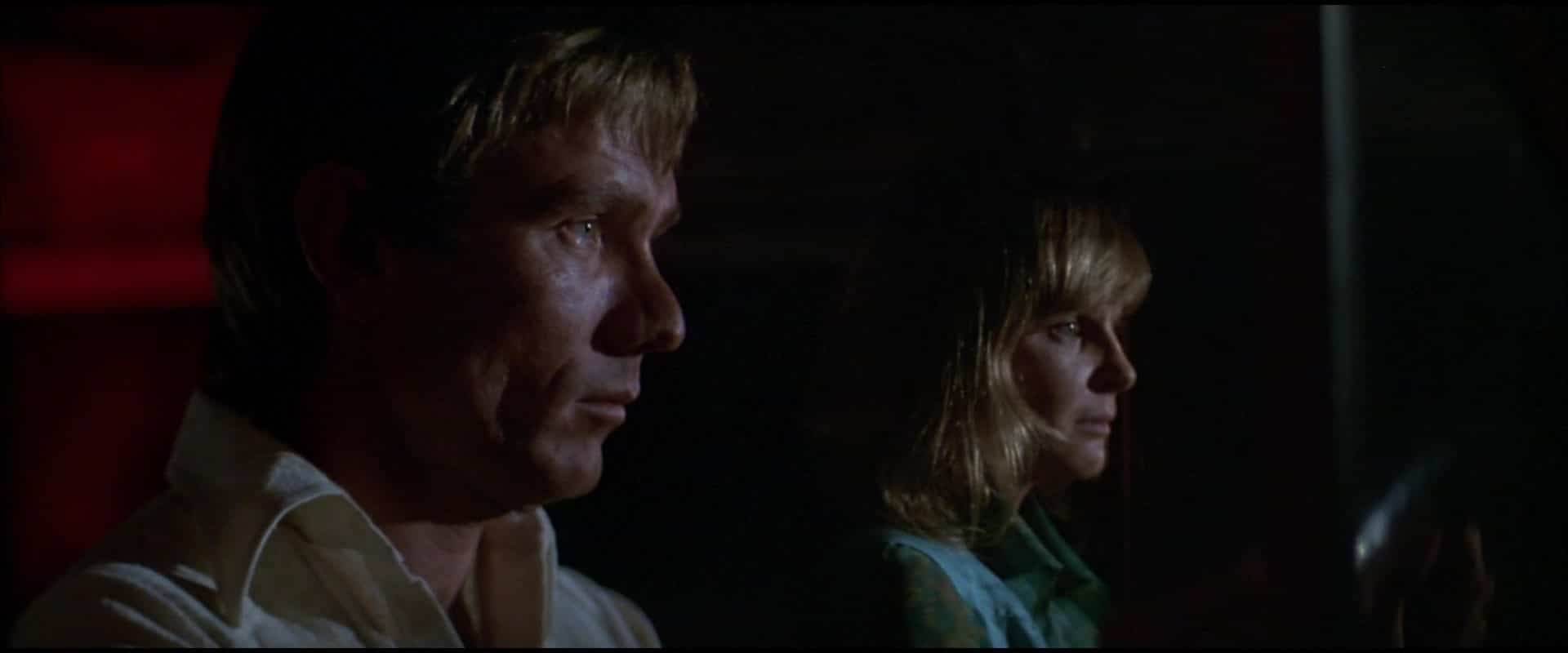 When we think of horror films which trap our protagonists in the wilderness far from civilisation, these tend to be backwoods shockers in the Texas Chain Saw/Hills Have Eyes mould, pitting the softer city folk against brutal, frequently inbred country bumpkins. Alternatively, such a setting might see its human cast at the mercy of some sort of unusually large and aggressive animal. When you boil it right down, though, such narratives are invariably about humankind versus the elements, how flesh and bone invariably stands no chance against the timeless, ageless, unstoppable ravages of nature. 1978 Australian horror movie Long Weekend explores this idea in a hugely compelling and inventive manner, centring on a struggling married couple played by John Hargreaves and Briony Behets who, at the husband’s behest, venture out to a remote, secluded beach for a getaway, in the hopes of saving their relationship. However, it quickly becomes evident that not only their relationship is beyond saving, but that they themselves have little hope of getting out of there alive, as nature itself seems set on destroying them.
When we think of horror films which trap our protagonists in the wilderness far from civilisation, these tend to be backwoods shockers in the Texas Chain Saw/Hills Have Eyes mould, pitting the softer city folk against brutal, frequently inbred country bumpkins. Alternatively, such a setting might see its human cast at the mercy of some sort of unusually large and aggressive animal. When you boil it right down, though, such narratives are invariably about humankind versus the elements, how flesh and bone invariably stands no chance against the timeless, ageless, unstoppable ravages of nature. 1978 Australian horror movie Long Weekend explores this idea in a hugely compelling and inventive manner, centring on a struggling married couple played by John Hargreaves and Briony Behets who, at the husband’s behest, venture out to a remote, secluded beach for a getaway, in the hopes of saving their relationship. However, it quickly becomes evident that not only their relationship is beyond saving, but that they themselves have little hope of getting out of there alive, as nature itself seems set on destroying them.
The original Long Weekend has been a notable gap in my horror education for a good while. I first became aware of it via two films made in 2008: the wonderful Ozploitation documentary Not Quite Hollywood, and the less-than-wonderful Long Weekend remake, the latter of which I struggle to remember much about beyond Jim ‘The Passion of the Christ’ Caviezel taking the male lead and struggling with the Australian accent. As regards the 1978 film’s appearance in the definitive account of Australian exploitation; while the last thing I want to do is get into one of those “oh, it’s not really horror, it’s more than that” diatribes of which we see so many from ignorant high profile critics, it’s still fair to say that if you approach Long Weekend expecting your classic Ozploitation, you may not get what you’re looking for. First-time feature director Colin Eggleston, working from a script by Everett De Roche (writer of another notable 1978 Australian horror, Patrick), isn’t shooting through the broad, overly cartoonish lens favoured by the likes of Brian Trenchard-Smith, with blood, boobs, brawls and things going boom in abundance. This is a considerably quieter, more grounded and character-based affair in which the primary focus is on the psychological breakdown of the characters, whilst the nature (no pun intended) of the forces working against them – far from the more tangible threat of a madman or a monster – remains abstruse throughout. Think Don’t Look Now, or for a more recent example 2013’s Honeymoon, and you should have a better idea of what to expect.
 The 1970s saw the rise of James Lovelock’s Gaia hypothesis and the beginnings of Green politics and environmental awareness, and these certainly seem to make their presence felt in Long Weekend. While ostensibly the main focus is on the couple’s relationship rapidly falling apart before our eyes, the film also makes a repeated point of emphasising their total disregard for their surroundings: without a moment’s thought the pair toss their garbage, spray bugs, kill wildlife, and generally smash up the wilderness to better suit themselves. Hargreaves’ Peter in particular, while fancying himself the outdoors type, wreaks the most havoc, chopping down a tree with an axe and shooting at birds willy-nilly for no better reason than to amuse himself. There’s little debate on his contemptuousness, then, nor does Behets’ Marcia do much to redeem herself; indeed, there’s no avoiding that from early on both parties are presented as thoroughly unsympathetic, leaving us rooting for nature to take its revenge from early on. (That having been said, some viewers are likely to take exception to the reported event which is implied to have been Marcia’s greatest ‘crime against nature.’)
The 1970s saw the rise of James Lovelock’s Gaia hypothesis and the beginnings of Green politics and environmental awareness, and these certainly seem to make their presence felt in Long Weekend. While ostensibly the main focus is on the couple’s relationship rapidly falling apart before our eyes, the film also makes a repeated point of emphasising their total disregard for their surroundings: without a moment’s thought the pair toss their garbage, spray bugs, kill wildlife, and generally smash up the wilderness to better suit themselves. Hargreaves’ Peter in particular, while fancying himself the outdoors type, wreaks the most havoc, chopping down a tree with an axe and shooting at birds willy-nilly for no better reason than to amuse himself. There’s little debate on his contemptuousness, then, nor does Behets’ Marcia do much to redeem herself; indeed, there’s no avoiding that from early on both parties are presented as thoroughly unsympathetic, leaving us rooting for nature to take its revenge from early on. (That having been said, some viewers are likely to take exception to the reported event which is implied to have been Marcia’s greatest ‘crime against nature.’)
Part of what makes Long Weekend so fascinating is how it ventures into somewhat fantastical territory without seeming like a fantasy film. After all, while events occur in a manner which seems to defy logic and reason – paths seeming to send the protagonists in circles, attacks from animals which typically avoid people – none of it is entirely outside the realms of physical possibility. It’s also impressive, particularly given what a low budget production this is, that none of it ever comes off as silly; there are brief moments in which Hargreaves faces off against critters when the use of puppets threatens to prompt laughter, but the right tone is struck through judicious editing. Naturally it also helps that Hargreaves and Behets play the whole thing straight, both actors doing terrific work. Indeed, whilst the film is first and foremost a revenge of nature tale, it can just as easily be read as a straight marriage breakdown, the harshness of the elements and the wildlife merely reflecting the growing animosity between two people who were once in love.
Clearly one of the finest genre films ever to come out of Australia, Long Weekend is one which any self-respecting horror fan should make a point of seeing. Second Sight have done a fine job with this Blu-ray edition, which looks and sounds very good and boasts a host of decent extras, including full outtake interviews from Not Quite Hollywood with all the key surviving players from the film, which doesn’t include Eggleston or Hargreaves (De Roche has also since died), and an audio interview with Hargreaves. Also, if you’re a fan of slightly more academic extras (these seem to divide opinion, and I’d be lying if I said I’m particularly enthusiastic about them), we have a video discussion of the film with four Australian critics.
Long Weekend is available on Blu-ray now from Second Sight.
